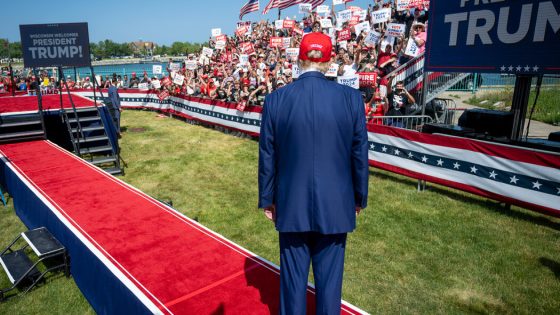Billionaires versus billionaires
Donald Trump has rapidly erased his cash disadvantage against President Biden, out-raising his Democratic rival for a second straight month. Powering that fund-raising haul was a coterie of well-heeled supporters who donated millions shortly after the former president was convicted of 34 felony counts in New York.
But wealthy donors are still giving to Biden, and his campaign has used its big early financial lead to build a political machine in key battleground states. That means that success in November may come down in part to which side can keep tapping its billionaire backers for cash.
The numbers: Trump and the Republican National Committee raised $141 million last month, compared with Biden and the Democratic National Committee’s $85 million. And a partial count yesterday showed Trump and the R.N.C. had a war chest of at least $170 million, compared with $212 million for Biden and the D.N.C.
Wealthy conservatives are coming off the sidelines. Chief among them last month was Timothy Mellon, an heir to the Mellon fortune who donated $50 million to a pro-Trump super PAC. Shortly after receiving the money, the super PAC booked $100 million in ad spots through Labor Day.
It’s a reminder that many donors have gotten over any misgivings about Trump. That includes some who publicly denounced Trump’s attempts to overturn the 2020 election result and his role in the Jan. 6 Capitol riots. Among them: Steve Schwarzman of Blackstone, who cited economic, immigration and foreign policy concerns in announcing his support for Trump last month.
Many hope to get what they view as a more pro-business candidate in the White House, even though the stock market has soared under Biden. Trump’s current backers include financial and oil magnates hoping for deregulation.
They also include members of the crypto community: The Winklevoss twins, whose Gemini exchange has been under pressure from regulators, said yesterday that they each had donated $1 million in Bitcoin to back his campaign.
Biden donors are keeping up the fight. Mike Bloomberg recently gave nearly $20 million to the president’s re-election efforts. And Melinda French Gates gave Biden her first political endorsement: “This year’s election stands to be so enormously consequential for women and families that, this time, I can’t stay quiet,” she posted on X.
One question: How effectively is the money being spent? For Biden, the cash is being spent to build out an on-the-ground political machine and on TV advertising. But some Democratic figures (and the Trump campaign) note that the heavy ad spend hasn’t moved Biden’s poll numbers much.
For Trump, much of the cash is going to ads — but also to pay for his voluminous legal bills, expenses that blunt some of the renewed financial support he’s getting.
-
In other campaign news: Trump was a guest on All-In, the podcast hosted by the venture capitalists David Sacks and Chamath Palihapitiya.
HERE’S WHAT’S HAPPENING
The Biden administration bans sales of Kaspersky Labs antivirus software in the U.S. The decision was based on fears that the Russian government’s influence on the Moscow-based company poses a national security risk. The Commerce Department also added Kaspersky to a trade restriction list, which could affect the company’s sales elsewhere.
The I.R.S. extends a freeze on a pandemic-era tax credit. The agency will continue to reject new claims for the Employee Retention Tax Credit, which was introduced in 2020 and allows businesses to collect up to $26,000 for each worker on its payroll. The decision followed internal analysis that found that a majority of outstanding claims appeared to be improper.
Anthropic introduces its latest competitor to OpenAI’s artificial intelligence model. The start-up unveiled Claude 3.5 Sonnet, a new large-language model that it said beat the latest version of OpenAI’s GPT-4o in some benchmarks. The announcement is the latest example in the race among A.I. companies to release innovations, a contest that requires substantial funds and technical resources.
American Airlines flight attendants threaten to go on strike. The union representing the company’s 28,000 flight attendants said that it still hadn’t reached an agreement on a new contract. It urged members to prepare for a walkout, though the union couldn’t call for one until it received permission from the National Mediation Board.
Taxing times
The Supreme Court yesterday upheld a Trump-era tax on foreign income, a decision that experts said preserved the nation’s tax system.
But it also threw a potential lifeline to Democratic efforts to tax the assets of the rich rather than just their income, writes The Times’s Jim Tankersley.
The context: A Washington State couple, backed by the free-market Competitive Enterprise Institute, argued that a provision of a 2017 law that imposed a one-time tax on Americans who own 10 percent or more of U.S.-owned or controlled foreign companies was unconstitutional. The justices rejected the challenge in a 7-to-2 ruling.
The decision was closely watched for how it might affect a potential wealth tax. President Biden and other Democrats have proposed raising taxes on the rich and companies. This could include taxing multimillionaires on unrealized gains as their assets increase in value, which conservative opponents argue would be unconstitutional.
Opinions in the case suggest a sharp divide among justices on such a tax. Justice Ketanji Brown Jackson essentially laid out a blueprint for defending a wealth tax, writing that precedent showed decisions should be left to Congress and voters.
But Justice Amy Coney Barrett wrote that while she agreed to uphold this tax, she might not agree to do the same for a wealth tax.
Liberals and conservatives said they looked forward to such a fight:
-
“The fight goes on to tax the rich, pass a wealth tax on ultra-millionaire and billionaires, and make the system more fair,” Senator Elizabeth Warren, Democrat of Massachusetts, wrote on X.
-
Dan Greenberg of the Competitive Enterprise Institute said those opposing a wealth tax would be “likely to receive a friendly audience from a substantial portion of the court.”
Tax is a political hot-button issue in this election. Donald Trump has promised to cut taxes on the wealthy and corporations, while President Biden has spoken of raising taxes on the wealthy in an appeal to working-class voters and organized labor.
Treasury Secretary Janet Yellen said this month that relying on tax cuts to boost growth isn’t good for workers. (But she has also pushed back against calls for a global wealth tax.)
Can Europe shake off Swiftian inflation?
Over the past year, economists and analysts have been trying to quantify the economic impact of Taylor Swift’s Eras Tour, with the U.S. numbers running into the billions. Swift is now touring across Europe, where she’s creating a bonanza for the hotels, restaurants and other services in and around the cities where she’s playing.
But for Europe’s economists, there’s another important consideration: the effect she might have on inflation, The Times’s Eshe Nelson writes for DealBook.
Central bankers in Europe are cutting interest rates, or are poised to, as inflation has slowed. But economists are paying attention to every data point because every potential bump in inflation data matters. That includes the Eras Tour, whose effect on airfare, hotels and restaurants could push up prices.
Policymakers want confirmation that their economies are on the right path, and recent surprises in services inflation are making them tread cautiously. Central bankers are scrutinizing any blip in pricing data to distinguish one-off effects from longer-lasting trends.
It’s all a matter of timing. The impact of Swift’s tour might only show up in a country’s inflation stats if an Eras show falls on the same date that national statisticians collect price data to compute inflation rates. If that happens, then the higher prices that Swifties are paying for hotels, for example, could affect the overall inflation rate.
This could happen in Britain in August, when Swift plays a second set of shows in London, according to Lucas Krishan, a strategist at TD Securities. He’s in a position to know: For the past eight months, Krishan and his colleagues have been tracking hotel prices across the country to replicate as closely as possible the information that would be collected by Britain’s statistics agency.
“All those tiny quirks are going to matter a lot,” Krishan said.
“The fish that got away was big.”
— Masa Son, the founder of SoftBank, on selling his company’s stake in Nvidia in 2019, missing out on the meteoric rise in the chip company’s stock price. (SoftBank would have reaped some $150 billion in additional paper gains.) Speaking at SoftBank’s annual meeting today, Son also said that he had wanted to buy Nvidia in 2016, but couldn’t make a deal work.
In the papers
Some of the academic research that caught our eye this week, summarized in one sentence:
-
Most ordinary people think that higher interest rates cause inflation, a challenge for policymakers to explain traditional inflation-fighting actions. (Alberto Binetti, Francesco Nuzzi and Stefanie Stantcheva)
-
New rules to govern global trade are needed that take climate change, political power imbalances and rapid technological innovation into account. (Martin Guzman and Joseph Stiglitz)
-
Companies are letting algorithms set their prices dynamically and nobody knows what happens next. (Martin Spann et al.)
-
How to interpret a 13th-century Florentine ledger, one of the earliest examples of double-entry accounting. (Alan Sangster)
-
A regression analysis of people’s well-being and their Zodiac signs found “no robust associations” with career or financial satisfaction. (Mohsen Joshanloo, a Libran)
THE SPEED READ
Deals
-
Revolut, the SoftBank-backed digital bank and Europe’s most valuable start-up, is reportedly weighing a stock sale at a $40 billion valuation. (FT)
-
Tony Ressler, the co-founder of the investment firm Ares Management, is said to be among the financiers who bought a collective 10 percent stake in Bill Ackman’s Pershing Square. (Bloomberg)
Elections, politics and policy
Best of the rest
-
A close look at pharmacy benefit managers — the middlemen like Caremark and Express Scripts that have been accused of driving up drug prices for millions of people, employers and the government. (NYT)
-
“China Is Mixed on Elon Musk — but They Sure Love His Mom” (WSJ)
We’d like your feedback! Please email thoughts and suggestions to [email protected].
Source Agencies


